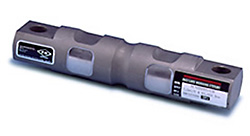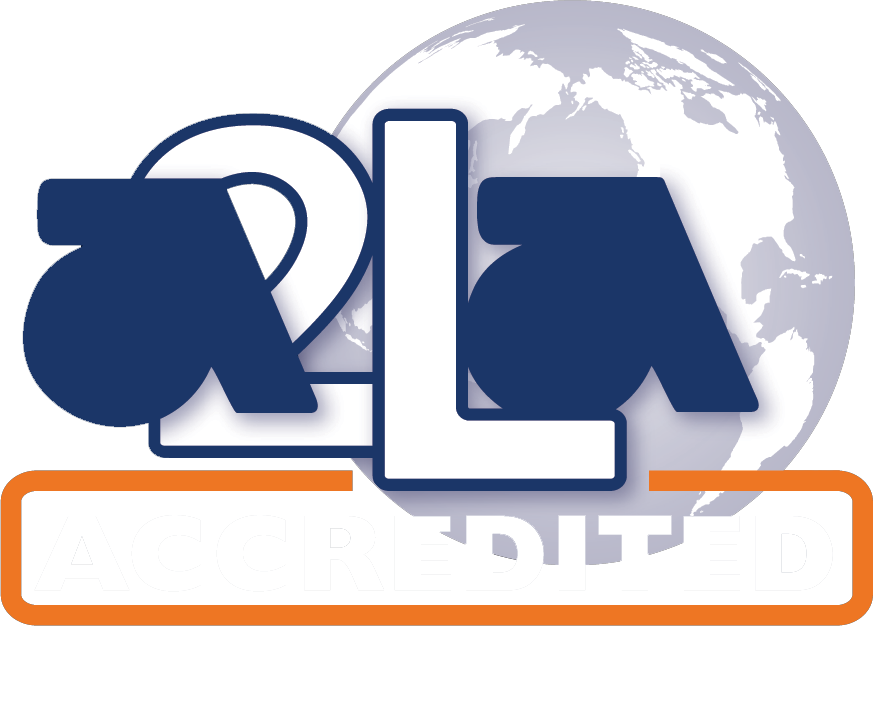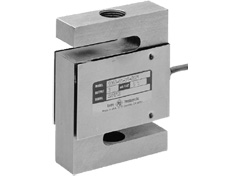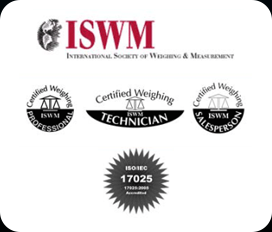Load Cells and Weigh Bars
Industry SolutionsMeat & Poultry ServicesCalibration Services |

In weighing and force applications, load cells are often a key component. In a weighing system, load cells serve as transducers as they are stimulated by an applied load and produce a signal in the form of voltage. Most load cells used in weighing and force applications are strain gauge load cells. A strain gauge is a foil that when put under stress as part of a circuit, causes resistance. As a force is applied to the load cell, the wires or foils that comprise the strain gauge are stimulated by the compression or tension force, and, when placed in a circuit, create a change in voltage (excitation) which can subsequently be interpreted, converted, and displayed by an indicator. Often when load cells break in industrial applications, this is due to damage to the strain gauge. As such, load cell manufacturers are constantly innovating new ways to strengthen their load cells and protect the internal strain gauges. One can extend the useful life of a weighing or force measurement system by choosing a load cell with thoughtful design. For example, Weigh Bars from Avery Weigh-Tronix use a cylindrical design with an imbedded strain gauge – the cylindrical design provides inherent strength and makes them more resistant to damage from lateral force than a typical load cell. Contact Precision Solutions for assistance selecting the most suitable load cell for your environment. Load Cell Types and OptionsWhen determining what load cell is most suitable for an application, one must consider how the load cell will be used. Some load cells are suitable in applications where they will be subject to both compression and tension; other load cells are suited for either compression or tension. Load cells can come in many forms, and every industrial application requires different types of load cells. Precision Solutions offers load cells from leading manufacturers including Avery Weigh-Tronix, Minibea Intec, and Rice Lake. Our Product Specialists partner closely with each client to find the right load cell for their specific environment. Common load cells found in industrial applications include single-ended beam load cells, double-ended-beam load cells, s-type load cells, and canister load cells.
Load cells should be chosen with careful consideration for a multitude of factors in industrial applications where they will be placed. Choosing the correct load cell can change the durability, accuracy, precision, and safety of the load cell when placed in an industrial application. Some factors one should consider when choosing a load cell include:
Advantages of Weigh Bars from Avery Weigh-TronixOne of the major advantages of Weigh Bars is that when compared to other load cell designs, their instance of failure is extremely low. While the failure rate of other load cells averages between 4-5%, Weigh Bars have a failure rate less than 1%. Weigh Bars are long-lasting devices that take much longer to reach their peak fatigue point than your average load cell while also offering a great deal of accuracy. In addition, the Weigh Bar is typically made from stainless steel or an aircraft-quality alloy contained within a five-layer seal containing a metal shield, acrylic, poly-sulfide, primer and polyurethane – this makes them incredibly resistant to harsh environments. All of the wiring for the associated strain gauge is contained within the Weigh Bar, which minimizes risk of damage to the sensitive electrical components. Integrating and Automating Weighing with Load CellsLoad cells are often used in tandem with tanks and hoppers including in process weighing applications. Load cells may be used to control filling, batching, blending, or bulk discharge processes in manufacturing. In those instances, the load cells need to be programmed and integrated with control devices and adjacent manufacturing processes may need to be automated. As a scale distributor, industrial systems integrator, and ISO 17025 Accredited calibration company, Precision Solutions is uniquely positioned to help its clients with their load cell applications. Whether you are looking to control weighing processes via a PLC or send production data to your ERP, the Integrated Solutions team at Precision Solutions can assist you in designing an effective solution. Learn more about our custom solutions here. Contact Precision Solutions Inc. for Quality Load Cells and Weigh Bars for Sale TodayPrecision Solutions Inc. is a leader in industrial calibration, weighing and force measurement, scale repair and industrial scale integration for a wide variety of industries, ranging from pharmaceutical manufacturing to food and beverage. If weighing is a critical process in your business, we want to be your partner. Contact us today! |




